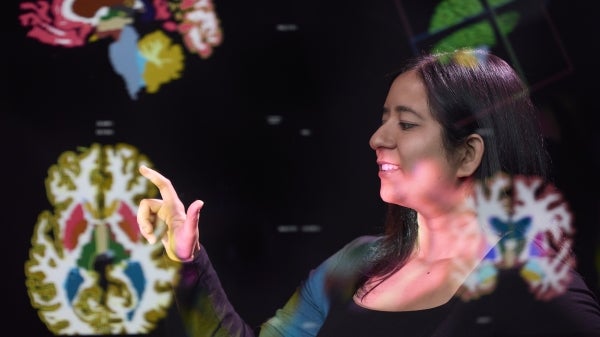New ASU, Vietnam alliance will amplify long-standing partnership

ASU President Michael Crow (left) signs a letter of intent with representatives of Vietnamese Ministry of Science and Technology — Hoang Minh, Tran Ngoc Ca and Nguyen Manh Quan — at the offices of the McCain Institute at Arizona State University in Washington, D.C., on May 30.
Arizona State University and the Vietnamese Ministry of Science and Technology (MOST) today announced a partnership to advance research and academic programs in science, engineering, technology and innovation (SETI) across Vietnam.
The SETI Alliance, which builds on existing, U.S. government-supported initiatives between ASU and MOST, coincides with Vietnam Prime Minister Nguyen Xuan Phuc’s visit to the U.S. this week to meet with President Donald Trump.
Key to the new partnership is a framework through which ASU, the Vietnamese Ministry of Science and Technology, Vietnamese technical universities, research institutes and private industry can share knowledge, culture and experience.
“We would like to reconfirm the importance of scientific research, innovation and technology implementation for the development of our country,” said Vice Minister of Vietnam Ministry of Science and Technology Tran Quoc Khanh. “And we understand that the collaboration in science, technology and innovation between Vietnam and the U.S. has a key role in this process.”
Because of the long-standing relationship of the ASU-led, industry-government-academic collaborative in Vietnam, the impact of the SETI Alliance will extend beyond the field of engineering and the borders of its partners, affording global opportunities for collaborative innovation.
Students will have hands-on, project-based learning models delivered with an entrepreneurial mind-set — in English. Both U.S. and Vietnamese students will benefit from the intercultural education and applied research that the alliance will lead. Students with advanced, collaborative engineering and technical skills developed through the program will be in demand by employers in global markets that extend beyond the U.S. and Vietnam.
The expansion of research parks and maker spaces in Vietnam and connecting MOST to ASU and Arizona’s entrepreneurial ecosystems will facilitate entrepreneurial ventures and investments on both sides of the ocean.
“The Vietnamese government and ASU and the private sector share a strong history of collaboration,” said ASU President Michael Crow, who met with Vietnamese Ministry of Science and Technology leaders while in Washington, D.C. “Amplifying our eight-year history of facilitating partnerships in Vietnam between government, academia and private-sector partners will ensure that country’s employers have access to the same kind of highly trained workforce we provide to industry partners at ASU.”
The SETI Alliance extends beyond “brick and mortar” education delivery to reach thousands of learners across Vietnam through EdPlus, ASU‘s online, international degree program, with its digital immersion learning platforms and technologies.
The alliance will pioneer a new model for global STEM education, providing students from both Vietnam and the U.S. with opportunities to study abroad, participate in student exchange and summer programs and gain practical experience in overseas cooperative education and internships.
The SETI Alliance builds on the success of the Higher Engineering Education Alliance Program (HEEAP), which was launched in 2009 as a public-private partnership between ASU, the United States Agency for International Development (USAID) and Intel. It focused on improving Vietnam’s engineering faculty instruction, developing university leadership capacity and boosting student outcomes. The partnership also initiated industry-education engagement in Vietnam and began the process of acquiring regional and national accreditation for engineering programs.
“The Fulton Schools of Engineering engagements established initially by HEEAP have been exemplary in their advancement of engineering higher education in Vietnam,” said Kyle Squires, dean of the Fulton Schools. “The foundation, now firmly established, has provided the means to substantially broaden our activities via this partnership, and in novel ways owing to ASU’s size, scale and inherently innovative nature.”
Through HEEAP and other ongoing ASU-USAID-industry collaborative programs, more than 1,000 Vietnamese engineering faculty members have participated in advanced coursework at ASU in Tempe, Arizona, and nearly 6,000 engineering and STEM educators have participated in workshops in Vietnam. To date, 15 Vietnamese engineering degree programs are regionally accredited through the Association of Southeast Asian Nations (ASEAN) University Network (AUN), and two have received international accreditation through ABET, the international accreditation program for science and engineering degrees. These milestones have supported Vietnam’s position as a leader in education, research and innovation among emerging ASEAN markets.
“This partnership will enable expanded research and academic partnerships, foster collaboration between students and faculty members, and ultimately deepen the partnership between our two countries,” said Sen. John McCain (R-Ariz.) in an address to partnership leadership in Washington. “ASU, the great state of Arizona and the country are fortunate to strengthen the relationship with Vietnam through this new educational initiative.”
More Science and technology

Podcast explores the future in a rapidly evolving world
What will it mean to be human in the future? Who owns data and who owns us? Can machines think?These are some of the questions…

New NIH-funded program will train ASU students for the future of AI-powered medicine
The medical sector is increasingly exploring the use of artificial intelligence, or AI, to make health care more affordable and…

Cosmic clues: Metal-poor regions unveil potential method for galaxy growth
For decades, astronomers have analyzed data from space and ground telescopes to learn more about galaxies in the universe.…